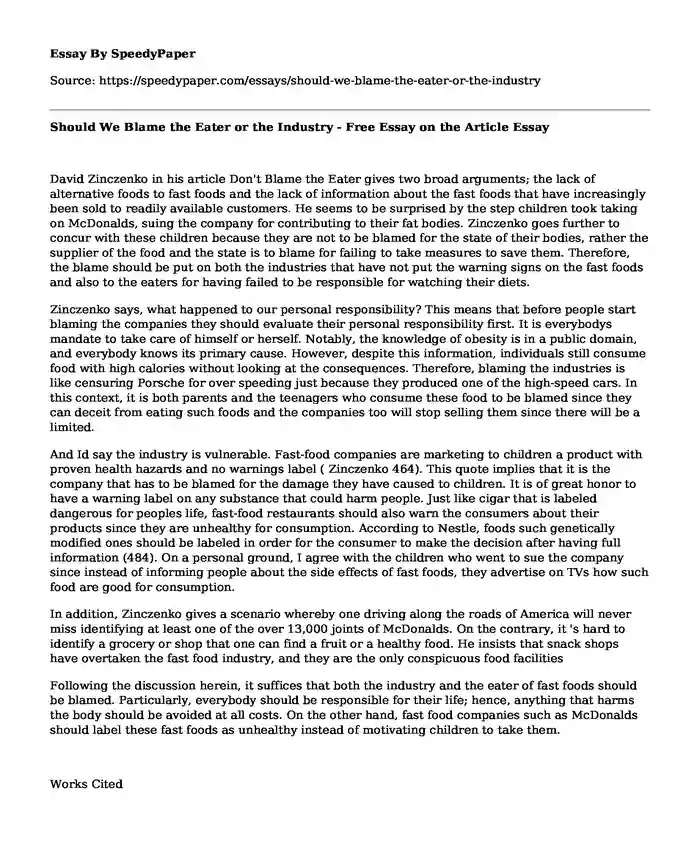David Zinczenko in his article Don't Blame the Eater gives two broad arguments; the lack of alternative foods to fast foods and the lack of information about the fast foods that have increasingly been sold to readily available customers. He seems to be surprised by the step children took taking on McDonalds, suing the company for contributing to their fat bodies. Zinczenko goes further to concur with these children because they are not to be blamed for the state of their bodies, rather the supplier of the food and the state is to blame for failing to take measures to save them. Therefore, the blame should be put on both the industries that have not put the warning signs on the fast foods and also to the eaters for having failed to be responsible for watching their diets.
Zinczenko says, what happened to our personal responsibility? This means that before people start blaming the companies they should evaluate their personal responsibility first. It is everybodys mandate to take care of himself or herself. Notably, the knowledge of obesity is in a public domain, and everybody knows its primary cause. However, despite this information, individuals still consume food with high calories without looking at the consequences. Therefore, blaming the industries is like censuring Porsche for over speeding just because they produced one of the high-speed cars. In this context, it is both parents and the teenagers who consume these food to be blamed since they can deceit from eating such foods and the companies too will stop selling them since there will be a limited.
And Id say the industry is vulnerable. Fast-food companies are marketing to children a product with proven health hazards and no warnings label ( Zinczenko 464). This quote implies that it is the company that has to be blamed for the damage they have caused to children. It is of great honor to have a warning label on any substance that could harm people. Just like cigar that is labeled dangerous for peoples life, fast-food restaurants should also warn the consumers about their products since they are unhealthy for consumption. According to Nestle, foods such genetically modified ones should be labeled in order for the consumer to make the decision after having full information (484). On a personal ground, I agree with the children who went to sue the company since instead of informing people about the side effects of fast foods, they advertise on TVs how such food are good for consumption.
In addition, Zinczenko gives a scenario whereby one driving along the roads of America will never miss identifying at least one of the over 13,000 joints of McDonalds. On the contrary, it 's hard to identify a grocery or shop that one can find a fruit or a healthy food. He insists that snack shops have overtaken the fast food industry, and they are the only conspicuous food facilities
Following the discussion herein, it suffices that both the industry and the eater of fast foods should be blamed. Particularly, everybody should be responsible for their life; hence, anything that harms the body should be avoided at all costs. On the other hand, fast food companies such as McDonalds should label these fast foods as unhealthy instead of motivating children to take them.
Works Cited
Nestle, Marion. Food politics: How the food industry influences nutrition and health. Vol. 3. Univ of California Press, 2013.
Zinczenko, David. "Dont Blame the Eater." New York Times 23 (2002).
Cite this page
Should We Blame the Eater or the Industry - Free Essay on the Article. (2020, Jun 10). Retrieved from https://speedypaper.net/essays/should-we-blame-the-eater-or-the-industry
Request Removal
If you are the original author of this essay and no longer wish to have it published on the SpeedyPaper website, please click below to request its removal:
- Alcoholism Essay Example
- Free Essay: A Critical Analysis of the Impact of Health Informatics on Healthcare
- Contempary Issues in Business - Free Essay Example
- Free Paper Sample on Sexual Assault and Substance Abuse Issues Within the Military
- Essay Sample on Understanding the Business Model
- Free Essay Example: Process Map
- Paper on Ensuring Safety for Healthcare Workers Amidst the COVID-19 Pandemic: A Call to Support OSHA
Popular categories





